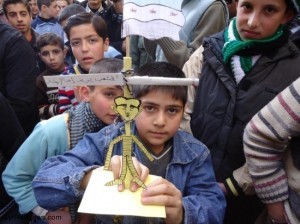Transitional Justice for Syria

Hamida, 36, lost her nephew in an explosion in the Kazzaz district, and a cousin in another blast in Jaramana in the suburbs of Damascus.
She was later forced to flee her home in the Hussayniyyah district outside Damascus, when her home was damaged in fighting. What Hamida wants above all else is accountability for the deaths of her nephew and cousin.
“The truth will help all of us in the family see that justice has been served,” she said. “We want an investigation to help us identify the real killers who planned and carried out the bombings.”
Politicians, writers and opposition activists have increasingly been talking about transitional justice as a way of helping Syria move to a pluralistic and inclusive system once the current regime falls, and to institute accountability instead of revenge and retribution.

“Transitional justice is a set of judicial and non-judicial measures that have been implemented by different countries in order to redress the legacies of massive human rights abuses… [it] promotes civic trust and strengthens the democratic rule of law,” according to a definition provided by the International Centre for Transitional Justice. “[It] is not … a ‘special’ kind of justice, but an approach to achieving justice in times of transition from conflict and/or state repression.”
States that have employed transitional justice mechanisms following civil conflict or state repression include Chile, Guatemala, South Africa, Poland, Sierra Leone and East Timor.
“The most important goal of transitional justice is to reunify a society that has gone through exceptional circumstances that affect its cohesion,” human rights activist Anwar al-Bunni said. “It’s the first step to rebuilding the community. This is very important to stop indiscriminate revenge and reassure victims that they will secure their rights through an efficient and swift mechanism.”
Bunni said that “transitional justice is very important… because it assures people who have not committed crimes that they will not be punished”. His approach, he said would ease current sectarian tensions, and time ensure that crimes committed by the opposition would also be punished.
According to Bunni, implementing transitional justice in Syria should be done in four phases: evaluating the damage done as a basis for compensating victims; conducting swift trials; forming national reconciliation committees made up of trusted figures like artists and clerics; forming committees to educate people about of transitional justice; and commemorating the revolution’s victims by naming streets and public buildings after them.
Legal activist Daad Moussa doubts that it will be possible to create a new judiciary. Instead, the current system should be reformed to root out corruption and ensure its independence.
“Public prosecution courts set up in all Syrian provinces should be put to use,” he said. “This institution should be the first to be used to implement transitional justice… especially since a transitional authority might not include an elected parliament able to
pass new laws.”
Bunni disagrees with Moussa about the merits of using the judicial institutions that exist now.
“The Syrian penal code does not address crimes of war or genocide,” he said. “In a transitional justice framework, renouncing one’s legal claims halts further legal action. That isn’t the case in a conventional judicial system, so that would not help lay the foundations for civil peace.”
Bunni argues that current systems for documenting of violations are essential but ultimately inadequate. He believes specialised committees should exist to assess material damage, for example differentiating between partial and complete destruction of property.
“Victims have an essential role in pursuing the goals of transitional justice, but we need to make the concept clear to them as a community… and then convince them that the sacrifices of the many [Syrians] played a positive role in building a healthy society,” Bunni continued.
“All victims should be compensated. People cannot contribute to rebuilding the country if their own homes have been demolished and they haven’t got a roof over their heads.”
Bunni and Moussa both agree that transitional justice is the only way to create a tolerant, healthy society in Syria in which everyone can feel safe.
Ayman, 29, who lost a brother and another relative in a summary execution in Homs, is the kind of person such a process would have to engage.
Asked whether he would be prepared to renounce a formal prosecution in exchange for financial compensation, he said, “That decision is not mine alone; it’s for the entire family.”
“The decision lies with my mother who lost her beloved son, and to my father who lost the light of his life,” he said. “I might forgive, but I won’t forget.”
